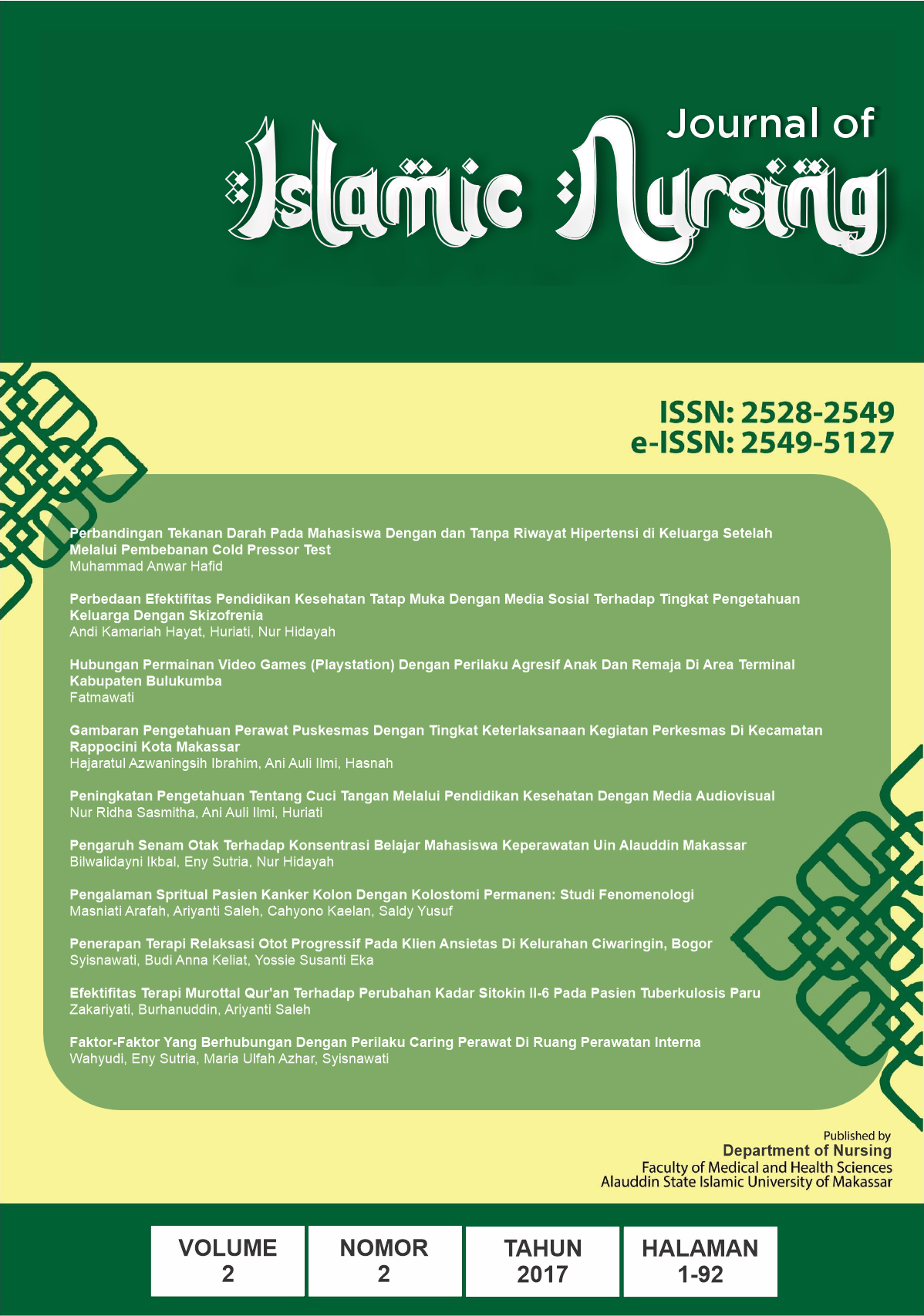PENGALAMAN SPRITUAL PASIEN KANKER KOLON DENGAN KOLOSTOMI PERMANEN: STUDI FENOMENOLOGI
Abstract
Background: The spiritual aspect is the most challenging thing in a permanent colostomy Muslim patient. The spirituality of a Muslim's religious perspective is influenced by religious practice or ritual. Installation of permanent colostomy leads to uncontrolled expulsion of feces (feces) and uncontrolled gas. This condition will give effect of ritual change of keagaaman to a Muslim that will influence spiritual. Method: This research used qualitative method of phenomenology approach, the selection of participants by purposive sampling chosen in accordance with inclusion criteria. Data collection is done through in-depth interviews, by providing open questions, voice recorder and field notes. Results of the research were: (1) positive spiritual change, (2) acceptance response to colostomy action, (3) change in the implementation of worship, (4) need guidance in conducting worship, (5) hope to further improve the quality of his worship. Conclusion: There was a positive spiritual change in the condition of permanent colostomy. However it affects the implementation of ritual worship in patients of Muslim patients.Downloads
References
Akgul, B dan Karadag. 2016. The Eff ect of Colostomy and Ileostomy on Acts of Worship in the Islamic Faith. J Wound Ostomy Continence Nurs. 00(0):1-6. DOI: 10.1097/WON.0000000000000237
Baldwin CM., Grant M., Wendel C., Rawl S., Schmidt CM., Ko C., dan Krouse RS. 2008. Influence of intestinal stoma on
spiritual quality of life of U.S. veterans. J Holist Nurs.
Black, Joyce M & Hawks, J. H. 2014. Keperawatan Medika Bedah: Manajemen Klinis untuk Hasil yang Diterapkan (8th ed.). Singapore: Elsevier Saunders.
Black, P. 2009. Cultural and religious beliefs in stoma care nursing. British Journal of Nursing, 18(13), 790–793.
Bulkley, J., McMullen, C,K., Hornbrook, M,C., Grant, M., Altschuler, A., Wendel, C,S & Krouse, R,S. 2013.Spiritual Well-Being in long-term colorectal cancer survivors with ostomies. Psychooncology. 22(11): 2513–2521. DOI :10.1002/pon.3318.
Cavdar, I., Ozbas, A., Akyus, N., Findik, U, Y., dan Kutlu, Y. 2013. Religious worship in patients with abdominal stoma praying and fasting during ramadhan. International Journal of Caring Sciences, 6(3), 516–522.
Celasin, H., Karakoyun, R., Yılmaz, S., Elhan, A. H., Erkek, B., & Kuzu, M. A. 2011. Quality of life measures in Islamic rectal carcinoma patients receiving counselling. Colorectal Disease, 13(7), e170 – e175.
Dabirian, A., Yaghmaei, F., Rassouli M., dan Tafreshi, M,Z. 2011. Quality of life in ostomy patients: a qualitative study. Dove Press Journal. DOI: 10.2147/PPA.S14508
Dedeli,O., Yildiz, E., dan Yuksel, S. 2015. Assessing the Spiritual Needs and Practices of Oncology Patients in Turkey. Holist Nurs Pract, 29(2):103–113. DOI: 10.1097/HNP.0000000000000070
Ellis MR, Campbell JD. 2004 Patients’ views about discussing spiritual issues with primary care physicians. Southern Medical Journal. 97, 12, 1158-1164.
Gonzalez, E., Holm K., Wennstrom., Haglind, E dan Angenete E. 2016. Self-reported wellbeing and body image after abdominoperineal excision for rectal cancer. International Journal Colorectal Dis. 31:1711-1717 DOI 10.1007/s00384-016-2628-0
Grant, M., Mccorkle, R., Hornbrook, M. C., Wendel, C. S., dan Krouse, R. 2013. Development of a Chronic Care Ostomy Self-Management Program. Journal Cancer Education, 28, 70–78. http://doi.org/10.1007/s13187-012-0433-1
Hawari, D. 2015. Ilmu kedokteran jiwa dan kesehatan jiwa dalam perspektif Al-Quran dan As-Sunnah (II). Jakarta: Badan Penerbit FKUI.
Iqbal, F., Zaman, S., Karandikar, S., Hendrickse, C & Bowkley, D, M. (2016). Engaging with Faith Councils to Develop Stoma-specific Fatawas: A Novel Approach to the Healthcare Needs of Muslim Colorectal Patients. J Relig Health. 55:803–811 DOI 10.1007/s10943-013-9772-4
Iqbal, F., Kujan, O., Bowley, D. M., Keighley, M. R. B., dan Vaizey, C. J. 2016. Quality of Life After Ostomy Surgery in Muslim Patients A Systematic Review of the Literature and Suggestions for Clinical Practice. J Wound Ostomy Continence Nurs, 0 (0), 1–7. http://doi.org/10.1097/WON.0000000000000235.
Imam Az-Zabidi. 2010. Buku Ringkasan Shahih Al Bukhari – Imam Az Zabidi. Insan Kamil
Khan M, A., Jamal, S., Rashid, R., dan Ahmad, N. 2011. Quality of Life Assessment in Patients with Stoma in Muslim Population. Ann. Pak. Inst. Med. Sci; 7(4): 222-227.
Majlis Fatwa Dewan Da'wah Islamiyah Indonesia. 2009. Nomor: 23/B/MF-DD/VIII/1430/2009 tentang Tatacara Ibadah Penyandang Stoma.
Nanda Internasional Inc. 2015. Diagnosis Keperawatan: Defenisi & Klasifikasi 2015-2017. (Herdman & Kamitsuru, Ed.) (Ed.10). Jakarta: Penerbit Buku Kedokteran EGC.
Taylor, D., Mulekar, M. S., Luterman, A., Meyer, F. N., Richards, W. O., dan Rodning, C. B. 2011. Spirituality within the patient-surgeon relationship. Journal of Surgical Education, 68(1), 36–43.


